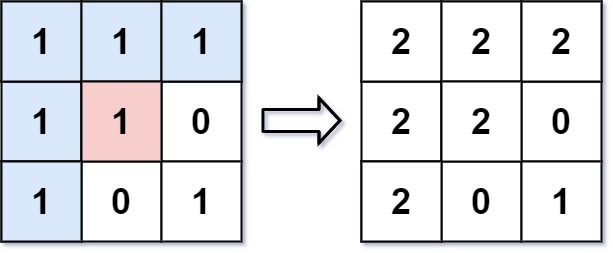Welcome to Subscribe On Youtube
733. Flood Fill
Description
An image is represented by an m x n integer grid image where image[i][j] represents the pixel value of the image.
You are also given three integers sr, sc, and color. You should perform a flood fill on the image starting from the pixel image[sr][sc].
To perform a flood fill, consider the starting pixel, plus any pixels connected 4-directionally to the starting pixel of the same color as the starting pixel, plus any pixels connected 4-directionally to those pixels (also with the same color), and so on. Replace the color of all of the aforementioned pixels with color.
Return the modified image after performing the flood fill.
Example 1:

Input: image = [[1,1,1],[1,1,0],[1,0,1]], sr = 1, sc = 1, color = 2 Output: [[2,2,2],[2,2,0],[2,0,1]] Explanation: From the center of the image with position (sr, sc) = (1, 1) (i.e., the red pixel), all pixels connected by a path of the same color as the starting pixel (i.e., the blue pixels) are colored with the new color. Note the bottom corner is not colored 2, because it is not 4-directionally connected to the starting pixel.
Example 2:
Input: image = [[0,0,0],[0,0,0]], sr = 0, sc = 0, color = 0 Output: [[0,0,0],[0,0,0]] Explanation: The starting pixel is already colored 0, so no changes are made to the image.
Constraints:
m == image.lengthn == image[i].length1 <= m, n <= 500 <= image[i][j], color < 2160 <= sr < m0 <= sc < n
Solutions
DFS or BFS.
Flood fill, also called seed fill, is a flooding algorithm that determines and alters the area connected to a given node in a multi-dimensional array with some matching attribute. It is used in the “bucket” fill tool of paint programs to fill connected, similarly-colored areas with a different color.
-
class Solution { private int[] dirs = {-1, 0, 1, 0, -1}; private int[][] image; private int nc; private int oc; public int[][] floodFill(int[][] image, int sr, int sc, int color) { nc = color; oc = image[sr][sc]; this.image = image; dfs(sr, sc); return image; } private void dfs(int i, int j) { if (i < 0 || i >= image.length || j < 0 || j >= image[0].length || image[i][j] != oc || image[i][j] == nc) { return; } image[i][j] = nc; for (int k = 0; k < 4; ++k) { dfs(i + dirs[k], j + dirs[k + 1]); } } } -
class Solution { public: vector<vector<int>> floodFill(vector<vector<int>>& image, int sr, int sc, int color) { int m = image.size(), n = image[0].size(); int oc = image[sr][sc]; int dirs[5] = {-1, 0, 1, 0, -1}; function<void(int, int)> dfs = [&](int i, int j) { if (i < 0 || i >= m || j < 0 || j >= n || image[i][j] != oc || image[i][j] == color) { return; } image[i][j] = color; for (int k = 0; k < 4; ++k) { dfs(i + dirs[k], j + dirs[k + 1]); } }; dfs(sr, sc); return image; } }; -
class Solution: def floodFill( self, image: List[List[int]], sr: int, sc: int, color: int ) -> List[List[int]]: def dfs(i, j): if ( not 0 <= i < m or not 0 <= j < n or image[i][j] != oc or image[i][j] == color ): return image[i][j] = color for a, b in pairwise(dirs): dfs(i + a, j + b) dirs = (-1, 0, 1, 0, -1) m, n = len(image), len(image[0]) oc = image[sr][sc] dfs(sr, sc) return image -
func floodFill(image [][]int, sr int, sc int, color int) [][]int { oc := image[sr][sc] m, n := len(image), len(image[0]) dirs := []int{-1, 0, 1, 0, -1} var dfs func(i, j int) dfs = func(i, j int) { if i < 0 || i >= m || j < 0 || j >= n || image[i][j] != oc || image[i][j] == color { return } image[i][j] = color for k := 0; k < 4; k++ { dfs(i+dirs[k], j+dirs[k+1]) } } dfs(sr, sc) return image } -
function floodFill(image: number[][], sr: number, sc: number, newColor: number): number[][] { const m = image.length; const n = image[0].length; const target = image[sr][sc]; const dfs = (i: number, j: number) => { if ( i < 0 || i === m || j < 0 || j === n || image[i][j] !== target || image[i][j] === newColor ) { return; } image[i][j] = newColor; dfs(i + 1, j); dfs(i - 1, j); dfs(i, j + 1); dfs(i, j - 1); }; dfs(sr, sc); return image; } -
impl Solution { fn dfs(image: &mut Vec<Vec<i32>>, sr: i32, sc: i32, new_color: i32, target: i32) { if sr < 0 || sr == (image.len() as i32) || sc < 0 || sc == (image[0].len() as i32) { return; } let sr = sr as usize; let sc = sc as usize; if sr < 0 || image[sr][sc] == new_color || image[sr][sc] != target { return; } image[sr][sc] = new_color; let sr = sr as i32; let sc = sc as i32; Self::dfs(image, sr + 1, sc, new_color, target); Self::dfs(image, sr - 1, sc, new_color, target); Self::dfs(image, sr, sc + 1, new_color, target); Self::dfs(image, sr, sc - 1, new_color, target); } pub fn flood_fill(image: Vec<Vec<i32>>, sr: i32, sc: i32, new_color: i32) -> Vec<Vec<i32>> { let target = image[sr as usize][sc as usize]; Self::dfs(&mut image, sr, sc, new_color, target); image } }